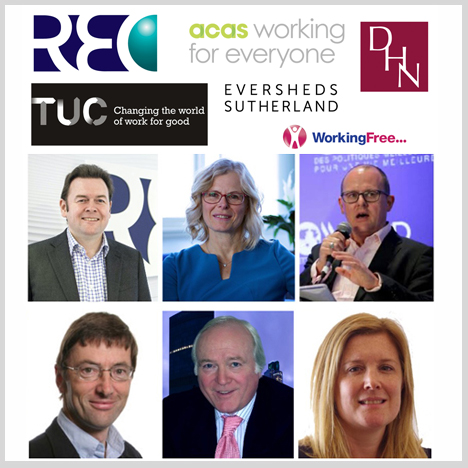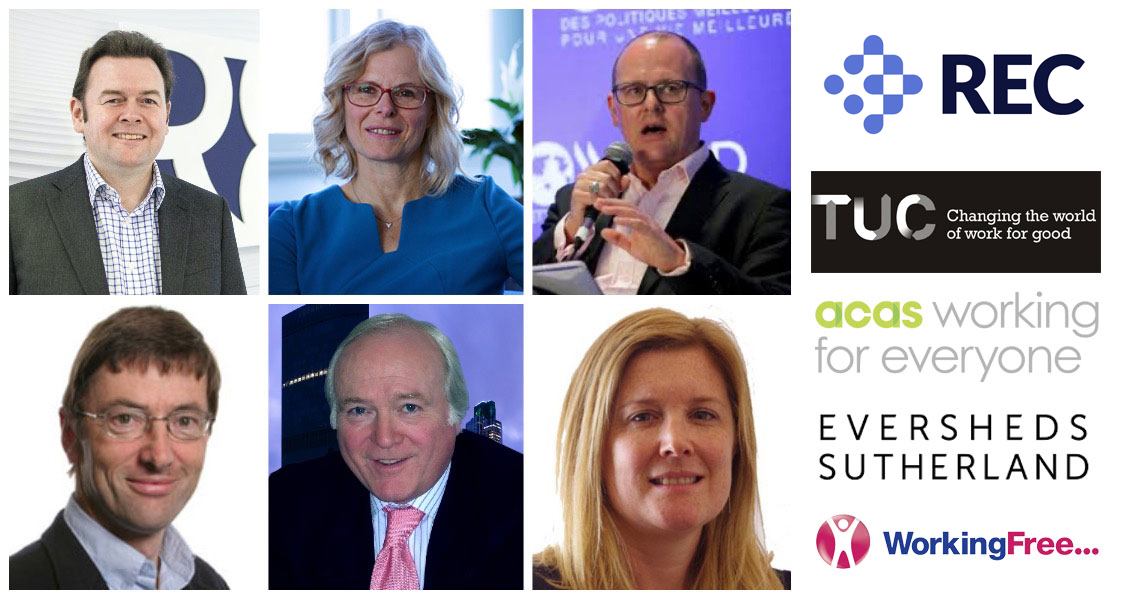
29.09.20 – Panel Discussion – Are we all NOW Gigworkers?

29th September.
5.00 – 6.30pm
Panel Discussion - Are we all NOW Gigworkers?
Important Message.
The original idea and discussion behind this highly topical Event took place in the late Autumn of last year. We started promoting it in January of this year having fixed the date as 22.4.20. Covid-19 changed all this and we re-fixed the date for 29.9.20 – taking the view that all would be “back to normal” by then. Alas, not so! Our Event on 29.9.20 will, therefore, be online.
But what it does enable us to do is examine the dramatic changes that have taken place since we first put this project together and will allow us to envisage how our working world might change in the months and years to come. The degree of change that has taken place to date is enormous – and is still going on – and will continue. Much of this is evidenced when you compare what we say and write now with what we said and wrote at the beginning of the year. Our Panel Discussion on 29.9.20 looks set to be an important one.
Are we all NOW Gigworkers?
Created and promoted by Devonshire House and driven by The Recruitment and Employment Confederation (REC), Eversheds Sutherland and Working Free, this interactive specialist Panel Discussion looks into the unprecedented changes in UK working practices. What are the emerging drivers? Where is it heading? Is it good news or bad news? What are the calls for action?
The purpose of this online Panel Discussion is to understand the current position and the divide between the different types of work models. Of all the words used – including Typical/ Atypical – none really fully hits the target – But “Gigworker” is the one that seems to capture the public and broader interest. If we can identify the trends and patterns in our working world, we can identify how we ought to react. We are looking for new insights, new knowledge and new solutions. The relevance of this is heightened by the advent of a new Government, keen to do new things and also to do things that its political adversaries have ushered them towards.
Join us on this journey!
Devonshire House people are “Director-level professionals in leadership roles who have an instinctive focus on the human side of enterprise.” We need to have a view – not only for the sake of the businesses we run – or advise – but also for ourselves and our own careers, our own futures and for those we influence!
“Our purpose, at Devonshire House, is to create, for our members, thinking time and space for key business issues and where people make the difference.” This Online Event – on 29.9.20 – is one occasion for you to do exactly this!
The starting point is to understand the current statistics. This online Event recognises the critical importance of this area but will only selectively and briefly look at it. This approach reflects the quantity and quality of what is available, its reliability driven by an unprecedented rate of change – including illusory changes – and the differing ways of measuring it and interpreting it. But what we do know is that the current position is serious, does have major implications for the future and needs careful discussion and management.
The issues here affect every aspect of human endeavour in the UK – Government, Businesses, Unions, Individuals, influencers and commentators.
- Government – Do they – and HMRC – recognise just how extensive atypical working actually is? If they do, they certainly seem to be undecided as to how to handle it. EG: IR35.
- Businesses – Hurrah for atypical work. Cheap, quick and bid-able which, if true, is bad news for some and good news for others. But vital for today’s 24/7 working, flexibility and efficiency. But it must be crucial to have a balance. Not always achieved, particularly in periods of major change.
- Unions – Decreasing membership. Difficulties in finding new membership targets. Is their traditional mission of preventing abuse working? Clearly, it is needed more now than ever and adapting to new working models is important.
- Individuals – Doors close – new doors open? Of course, they do! And speeded up by AI. The challenge is to find these opportunities and profit thereby. Very, very, do-able. But, certainly, lots of change. Growing comment about the increasing importance of individuals – with increasing evidence that some appointments are becoming employee-driven.
- Influencers and commentators. They need more information, more ambition, more excitement. Expose abuse – but celebrate successes. Is Shareholder return really colliding with ESG activism?
About Context and Content
The sweep between typical and atypical working patterns is very broad. It covers zero hours workers struggling to make ends meet all the way up to fat cats doing their own thing after a successful and highly remunerated c-suite role in a little-risk environment. In many ways, what we have now is an outcome of rapid change – such as happens in industrial revolutions; it almost drives itself with little third party interventions. It is also about money, about lifestyle choices. But it is also about ethics and morals.
Consider, for a moment Ken Loach’s latest film – Sorry We Missed You. This film shines a light on zero-hours contracts and their effect on family life. So says the FT’s review. Loach’s latest gritty film paints almost a nihilistic picture of gigworking at the entry-level. Not enough to live on, no legal protection, no social network and big unwanted risks leading to mental health issues. This has to be morally wrong by any standards. But is it true – and/or widespread? Where do responsibilities lay on making gig work pay for the worker and the employer? Who should do what. Youbcan see the YiuTube trailer here – https://www.youtube.com/watch?reload=9&v=ysjwg-MnZao
- Is Shareholder value giving way to ESG? If not, what impact is ESG having?
- Different generations have differing views on work and the work ethic.
- Places where people work are changing. Living where you want to live is increasingly NOT where you work.
- Real challenges for many – financially – socially- environmentally- and also infrastructure issues.
- Technology and AI is changing everything.
- The sort of work that people do is changing. Is STEM losing out?
- The shape of remuneration is changing – not enough for zero-hours workers. Too much for fat cats.
The Chair
Sophie White, Partner, Eversheds Sutherland
The Panel
- Martin Warren, Specialist Consultant at Eversheds Sutherland
- Neil Carberry, CEO, at the REC
- Susan Clews, CEO at Acas
- Paul Nowak, Deputy General Secretary at the TUC
- Charles Russam, MD at Working Free
About Sophie White
Sophie is a partner in Eversheds Sutherland Human Resources group. She is a highly experienced employment lawyer, who advises clients on complex transactional and contentious matters across a wide range of sectors including healthcare, technology, media and telecommunications, engineering, real estate, construction, financial services and private equity. Her experience includes: advising on the employment aspects of the IPO of Royal Mail plc, the European restructuring of a US Inc and the closure of UK operations of a European wide manufacturing company. She has written articles on subconscious bias for CIPD online and is the author of chapters on TUPE for Thomson Reuters and Redundancy for Tolleys.
About Martin Warren
After 30 years at Eversheds Sutherland, latterly as their Practice Group Head Partner responsible for Labour Relations, Labour Law, Trade Unions and Labour Relations Strategy, Martin Warren now operates as a Specialist Consultant with Eversheds with a focus on his specialist areas. Martin Warren is an experienced labour & employment lawyer, dealing with strikes , industrial action , advice to Corporations re labour relations strategy, Union negotiations, restructuring especially cross border downsizing , executive termination , Union recognition issues, collective bargaining agreements and European Works Councils.
About Neil Carberry and the REC
 Neil is CEO at the Recruitment & Employment Confederation, joining the organisation in June 2018. He began his career in recruitment, working for financial services firms and for a small search firm before doing a post-graduate degree in Human Resources at the LSE and joining the CBI in 2004. He is also a Non-Exec at ACAS, Chair of a primary academy trust, a Member of the World Employment Confederation and a Member of the Low Pay Commission. Neil is also an RFU L2 qualified rugby coach.
Neil is CEO at the Recruitment & Employment Confederation, joining the organisation in June 2018. He began his career in recruitment, working for financial services firms and for a small search firm before doing a post-graduate degree in Human Resources at the LSE and joining the CBI in 2004. He is also a Non-Exec at ACAS, Chair of a primary academy trust, a Member of the World Employment Confederation and a Member of the Low Pay Commission. Neil is also an RFU L2 qualified rugby coach.
The REC – The Recruitment and Employment Confederation – www.rec.uk.com – is the professional body for the UK recruitment industry. “The REC is all about brilliant recruitment” is their mantra – achieved through being the voice of the recruitment industry, championing high standards, speaking up for great recruiters, and helping them grow. The REC provides recruitment businesses with a wide range of training, legal, business and accreditation services and represents businesses through its corporate membership and individuals through the Institute of Recruitment Professionals (IRP). The Recruitment & Employment Confederation (REC) represents the interests of the private recruitment industry to government, business and media in both the UK and Europe. All corporate members abide by the Code of Professional Practice and individual members abide by the Code of Ethics and Professional Conduct. The REC is Recruitment’s biggest lobbying voice. As a source of knowledge and passionate about raising recruitment standards, the REC is dedicated to developing successful careers in recruitment and is committed to exceeding members’ expectations through business support.
About Susan Clews and ACAS

Susan Clews is CEO of Acas. Joining Acas in 2015, Susan was appointed CEO in Dec 2018, and was previously Operations Director, and before that, Strategy Director.
Susan sees her role as follows: “I am the chief executive at Acas and my goal is to lead Acas in making working life better for everyone in Britain, through practical advice and help with disputes at work. I believe creating great workplace relationships build better engagement and ultimately more successful business – which is good for employees, business and the economy.”
The Advisory, Conciliation and Arbitration Service is a Crown non-departmental public body of the Government of the United Kingdom. Its purpose is to improve organisations and working life through the promotion and facilitation of strong industrial relations practice.
About Paul Nowak and the TUC

As Deputy General Secretary at the TUC, Paul supports Frances O’Grady in leading the TUC and has been with the TUC for nineteen years. He works with external stakeholders on behalf of the TUC, sits on the board of ACAS and is also responsible for inter-union relations. The Trades Union Congress – www.tuc.org.uk – is the national trade union centre in the UK, the federation of trade unions in England and Wales, representing the majority of trade unions. There are fifty affiliated unions, with a total of about 5.6 million members.
About Charles Russam and Working Free

Charles is Managing Director of www.DevonshireHouseNetwork.co.uk and also www.WorkingFree.co.uk. He established the first mainstream Interim Management Search firm in the UK in 1982 which he sold to the current management in 2014 through an MBI to Russam GMS Ltd which has now been rebranded www.russam.co.uk in August 2019. Working Free is a specialist career advisory business, supporting senior Director-level Executives coming off the permanent payroll into an independent working lifestyle. We assert that around half the UK’s working population of 33m are “Self Drive Workers”. (A sort of massive gig economy – but hugely complex and continuously changing). We see the move – for a growing number of senior professionals – from Dependency to Independency as a crucial niche in the Career Advisory, Coaching and Outplacement market.
About Eversheds Sutherland

As a global top 15 law practice, Eversheds Sutherland – www.eversheds-sutherland.com – created by a combination of law firms Eversheds LLP and Sutherland Asbill & Brennan LLP, in February 2017, the firm provides legal advice and solutions to a global client base ranging from small and mid-sized businesses to the largest multinationals. They provide the full range of legal services, including corporate and M&A; dispute resolution and litigation; energy and infrastructure; insurance and financial services; human capital and labour law; intellectual property; real estate and construction; and tax.
About Devonshire House

Established about forty years ago, Devonshire House is a people-focused membership club for Director-level professionals in leadership roles who have an instinctive focus on the human side of Enterprise. Their aim is to create for their members thinking time and space for key business issues, and where people make the difference. Devonshire House runs about ten main Events each year – a mix of formal dinners, buffets, Directors Forums, Panel Debates, Panel Discussions – and some other specialist one-offs. The Devonshire House 2020 Programme is as impressive as ever, building on this high level and established format.
Programme
5.00pm Intro from the Chairman
5.10pm Panellists intro comments.
5.40pm Debate and Q&A
6.25pm Chairman’s closing comments
6.30pm Close
The intention is to voice-record the Event – as a basis for the publication of a discussion and subsequent Report.
Date & Time
LocatioN
ONLINE EVENT
The Chair

The Panel






